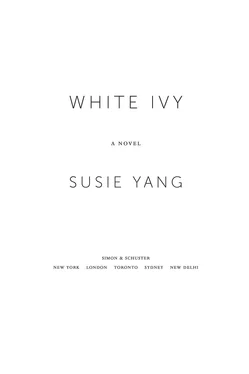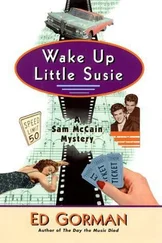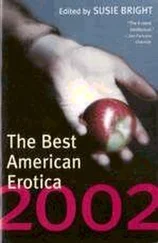Ivy deposited her cigarette butt in a half-empty Dr Pepper can. The impulse for destruction had passed. She had moved on to regret.
“Where you going?” said Roux.
“Home.”
“Are you going to come over later?”
“Don’t know.” She crawled back out the window even though she could have used the front door.
Meifeng was stir-frying meat on the wok when Ivy slipped in, the apartment smoky with the fragrance of garlic and scallions bubbling in oil.
“How was the library?” Meifeng asked.
“Fine,” said Ivy. She lingered in the doorway until Meifeng glanced her way. In some perverse, repentant way, she wanted to be caught. She was sure her shrewd grandmother would see through her, she would know that her granddaughter was not the same person as before. But Meifeng only told her to wash up before dinner and to take off that ridiculous hat.
Down the hall, Ivy saw light from underneath Nan and Shen’s closed door and heard their low voices but couldn’t make out what they were saying over the sound of the exhaust fan. She headed directly to the bathroom.
She took her time examining herself in the mirror, thinking how lovely her lips looked all swollen like that. Then came the disgust. She slapped her reflection to prove how deplorable she felt. But upon meeting her own clear, unflinching eyes in the mirror, the disgust turned into astonishment. Goose bumps rose up her arms. She was further gone than she’d thought.
When she came out from her shower, she heard the sound of a basketball game playing on the television. Her parents had come out of their bedroom. She went to her bedroom and closed the door. Soon, she heard Austin ask Nan if Ivy had come back yet. “Leave your sister be,” was Nan’s response. “She’s unwell.”
“She looked fine to me this morning,” said Austin.
“She’s sick on the inside,” said Nan.
Ivy beckoned her brother inside her room, pressing a finger to her lips. “Can you go to Mom’s room and find something for me? I don’t know where it is so you’ll have to look around.”
“What is it?”
She described the brown leather binding, the little gold clasp. “You’ve seen me writing in it—you remember.”
Austin said he knew what it looked like and scampered away. Ivy lay back in her bed, waiting. It only took a few minutes. “It was on the side table,” he boasted, handing her the diary. “It wasn’t even hidden.”
She tugged his earlobe in affection and told him to leave before their mother saw him talking to her. Alone, she looked at the diary, once her most prized belonging. Now it was only a liability.
She cut the spine open and splayed out the pages on the carpet. One by one, she shred each page into thin strips, then placed the strips into the large plastic basin Meifeng used to soak her feet in each night. She filled the basin with hot water. The pile of confetti disintegrated into a glob of gray mush, like old mashed potatoes.
She would be reborn. High school was a big place. In September, she would turn up the collar of her shirt, try out for cheerleading or lacrosse, wear her hair in a French braid with a ribbon, crisp and sweet-smelling, like autumn leaves. She would stop stealing. Also—she would never speak to Roux again. Both were not just sources of shame but liabilities, especially the latter. She would purge these memories from her mind, locked behind walls of steel, never to be reexamined. In later years, in high school and even into college, driven by heedless urges into the backseats of middle-class cars, cocooned inside tube slides in playgrounds, fucking soundlessly while her roommates pretended to sleep facing beer-splattered walls, she would tell the opposite lie of the one she’d told Roux: It’s my first time, I’m a virgin, I’ve never done this before . Everyone would believe her. She had long ago realized that the truth wasn’t important, it was the appearance of things that would serve her.
Muddy water, let stand, becomes clear.
PART TWO
4
“WE THINK IT WILL BE good for you to visit your relatives in Chongqing,” Shen said at the dinner table. It was four days after Gideon’s birthday party. The bruise on Ivy’s forehead had turned a pale mottled green, like a rotting lime. She clipped her bangs to the side and sat opposite her mother. She never smiled. Whenever anyone spoke to her, she would look them squarely in the eye, sit up straight in her chair, and respond in a dignified and cordial manner. She chewed her food thirty times before swallowing.
“Your aunt Hong misses you,” Shen continued, “and suggested that you go visit her. You can practice your Chinese and meet your cousins. My cousin Sunrin wants to take you traveling. She’s very educated, you’ll like her. You can spend the rest of your summer there until school starts.”
Ivy paused on bite twenty-three. A shard of panic pierced the fog of stoicism.
“I don’t think that’s a good idea,” she said.
“Your flight’s the day after tomorrow,” said Nan.
“Am I going?” Austin asked.
“No.”
“That’s not fair!”
“You’re not getting exiled,” said Ivy.
“We don’t have the money,” said Nan.
Ivy remembered very little of her childhood in Chongqing, but from Meifeng’s stories over the years, she’d developed a vivid picture of her birth country as a terrible place of Communists, farmers, little mud huts, persecution. It was what her parents always threatened when she and Austin were bad: “We’re going to send you back to China,” or “You wouldn’t last a week in China with real Chinese kids.”
On the evening before her exile, Meifeng brought her a hot towel rinsed in a basin of boiling water and dried herbs. Meifeng’s solution for everything in life was a hot towel to the face and a hot water bottle to the feet.
“What’s wrong with you these days?” she asked, placing the towel over Ivy’s forehead.
Ivy remained silent, but she felt a twinge of savage pleasure that her grandmother had noticed something was wrong.
“Good medicine tastes bad. Stop pretending you’re some tragic actress in a play. I get tired just looking at you.”
Hurt rolled over Ivy in hot waves.
“Do you know how much money your parents spent on your trip? Your mother’s been saving up to visit Hong for years, but she’s letting you go instead. She loves you so much she’d rather hurt you to make you better, even if it means you’ll hate her.” Following her granddaughter’s brooding gaze toward the dresser where a stack of CDs used to sit, Meifeng added, “You shouldn’t have had all that junk anyway.”
“It wasn’t junk.”
“How you got it was wrong.”
“ You do it.”
“I’m an old ignorant Chinese woman close to death. What do I have to lose? You’re an American citizen.”
Ivy let the hot steam from the towel cover her mouth, nose, lids. She pictured the view from her art classroom at Grove, looking out at a courtyard of wheat-colored poplar trees in autumn, the quiet splash of a quarter sinking into St. Mark’s fountain under the peaceful expanse of a cool blue sky.
Meifeng sighed, a movement that sent the entire bed creaking. Then she began to talk. Ivy thought it would be another one of her grandmother’s nostalgic rants about China, knife fights in damp alleyways, hunger, the mouthwatering taste of a fried egg on New Year’s, poverty—and in some ways it was. But it was also a story Meifeng had never before told anyone, the secret she’d kept for three decades.
FORTY-FOUR YEARS EARLIER, Nan Miao was born in the village of Xing Chang in the mountainous basin of Sichuan Province, cut through by three rivers intersecting at the mouth of the Yangtze River. It was a lush and fertile valley, with long, hot summers and damp, temperate winters. The rains began in June and stayed until the following spring, after which the fog would roll in, creating a misty beauty perfectly suited for watercolor landscapes, which many painters have tried to render. Due to the high year-round humidity and a diet of mountainous vegetables cooked in vats of bubbling chili oil, the girls grew up with pearly, lustrous skin, not a blemish or dry flake to be seen. Because of this perfect complexion, the beauty of Sichuan women became famous throughout China—they were known collectively as la mei nü, or “spicy beauties.”
Читать дальше












